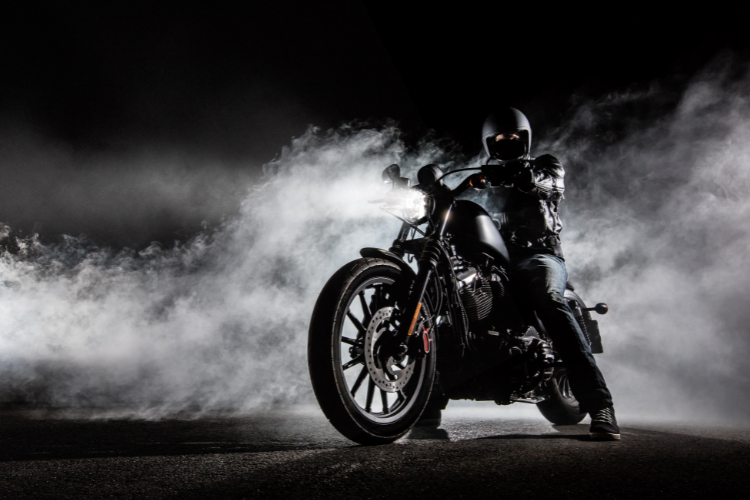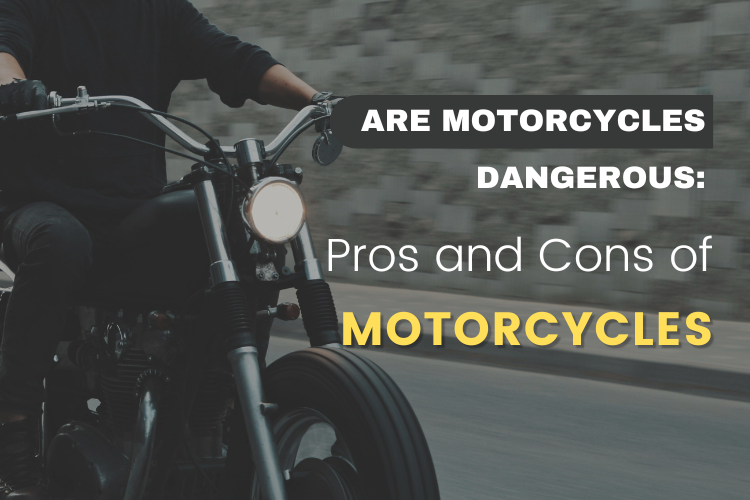Motorcycles offer a thrilling and liberating way to travel, attracting millions worldwide enthusiasts. In fact, as of 2023, there are over 8.8 million registered motorcycles in the U.S. alone, doubling since 2002. Whether for their fuel efficiency, ease of parking, or sense of adventure, motorcycles have an undeniable appeal.
However, riding a bike also comes with inherent risks. While the freedom they offer is unparalleled, motorcycles do pose safety concerns, so you need to weigh the pros and cons of motorcycles.
The National Highway Traffic Safety Administration (NHTSA) reports that motorcyclists are 22 times more likely than car occupants to die in a crash, emphasizing the importance of safety precautions. Additionally, the learning curve for riding bikes and exposure to the elements makes them less convenient for daily use than other vehicles.
This guide will break down the pros and cons of owning a motorcycle, helping you decide whether this mode of transportation is right for you.
Key Takeaways:
- While motorcycles have continued to grow in popularity, the safety of motorcyclists remains a top concern.
- Motorcycles offer several advantages, including easier parking, lower environmental impact, and a strong social community of riders, but they also have practical limitations, like limited storage and exposure to weather.
- Motorcycles are more cost-effective and fuel-efficient than cars, but riders must consider the challenges of maintaining a license, dealing with higher theft risks, and handling bad weather before making a purchase.
- If you are wondering whether or not to get a motorcycle, check out Best Motorcycles for Beginners.
In This Review:
Pros of Owning a Motorcycle

Owning a motorcycle comes with several appealing benefits that extend beyond the thrill of the ride. Motorcycles are known for their fuel efficiency and reduced environmental impact, often providing a deeper sense of community among riders. Additionally, they’re easier to park and maneuver in crowded urban environments, making them a practical choice for city dwellers.
Easier Parking
One of the top advantages of owning a motorcycle is how easy it is to find parking. Motorcycles can fit into tight spaces where cars cannot, making parking in congested urban areas or crowded event venues simple.
Cities with limited parking infrastructure also offer designated parking spots, providing even more convenience. The ability to avoid parking frustrations makes motorcycles an excellent option for city commuting.
Environmental Impact

Motorcycles are significantly more fuel-efficient than cars, contributing to lower carbon emissions and reduced environmental impact. Most bikes get between 50 to 70 miles per gallon (MPG), far surpassing the fuel efficiency of traditional motor vehicles, which average around 25 MPG.
This makes motorcycles a more eco-friendly transportation option for those looking to reduce their carbon footprint.
Social Community
Motorcycle ownership fosters a strong sense of camaraderie among riders. Motorbike clubs, riding groups, and events like rallies bring enthusiasts together, creating a tight-knit social community. The shared riding experience and passion for adventure make it easy to connect with other motorcyclists through local meetups or national rallies.
Cheaper Maintenance Than Cars
Motorcycles generally have lower maintenance costs compared to cars. They require fewer parts and less labor for repairs, making routine maintenance more affordable. Additionally, motorcycles consume less fuel, have simpler mechanical systems, and cost less for standard upkeep like oil changes, tires, and brake replacements.
However, riders should still ensure regular maintenance to keep their bikes in top condition.
Cons of Owning a Motorcycle

While owning a motorcycle has its perks, it’s also essential to consider the cons. From safety risks to practical limitations, motorcycles may not be the best option for everyone. Riders face the increased danger of accidents, limited storage space, and exposure to adverse weather conditions. Below, we’ll dive into the critical drawbacks of motorbike ownership.
Safety Concerns
Motorcycles are inherently more dangerous than cars due to their lack of protective barriers. Even with proper safety gear, riders are more vulnerable in an accident. According to the Insurance Institute for Highway Safety (IIHS), motorcyclists accounted for 15% of all traffic deaths in 2022 despite motorcycles representing only 3% of registered vehicles.
While helmets and safety training, including how to communicate with your fellow motorcycle riders through hand signals, can reduce the risk or serious injuries, it’s undeniable that riding a bike comes with safety concerns.
Maintaining a License May Be Challenging
Obtaining and maintaining a motorcycle license requires additional steps beyond a standard driver’s license. To get their license, riders must complete specific training courses and pass a skills test. In many states, the renewal process involves ongoing education, making it challenging to keep up with the legal requirements. Additionally, insurance premiums for motorcyclists can be higher due to the increased risk of accidents.
Easily Stolen

Motorcycles are among the most frequently stolen vehicles. Their small size and ease of transport make them attractive targets for thieves. According to the National Insurance Crime Bureau (NICB), 4,500 motorcycles are stolen monthly on average. Without a secure storage location or anti-theft devices, owners face a higher risk of losing their bike to theft.
No Bad Weather Coverage
Riding a motorcycle means being exposed to the elements. Rain, snow, and extreme temperatures can make travel both uncomfortable and dangerous. Motorcyclists need to wear weather-appropriate gear and plan for unpredictable conditions. Unlike cars, which provide a controlled environment, motorcycle riding does not offer shelter from bad weather.
Little Storage
One of the practical downsides of owning a motorcycle is the lack of storage space. While cars provide room for groceries, luggage, or other items, motorbikes offer very limited storage options.
Riders often need to invest in additional saddlebags or backpacks to carry their belongings, which can still fall short of the storage capacity needed for longer trips.
Less Longevity
Motorcycles generally don’t last as long as cars due to their smaller engines and exposure to rough conditions. While some bikes can last over 100,000 miles, many require major repairs or rebuilds after 50,000–75,000 miles. Frequent maintenance, riding conditions, and storage practices all play a role in a motorcycle’s lifespan.
Motorcycle FAQs
Are motorcycles dangerous?
Yes, motorcycles are more dangerous than cars due to the lack of physical protection for riders. Motorcyclists are more likely to suffer severe injuries or fatalities in accidents, as noted by the NHTSA.
However, wearing protective gear and completing rider safety courses can reduce the risk of injury.
How can I get a motorcycle shipped to me?
You can work with a professional vehicle shipping company like Sherpa Auto Transport to ship a motorcycle. We offer specialized motorcycle shipping services, ensuring your bike is transported safely using an enclosed trailer specifically outfitted for motorized vehicles.
Shipping a motorcycle is convenient for moving your bike long distances without adding mileage.
What's the best time of year to buy a motorcycle?
The best time of year to buy a motorcycle is typically in the fall after the riding season has ended. Demand tends to be lower during the cooler months, which can result in better prices and more negotiating power with sellers.
Look at dealerships and private sellers during this time for potential deals.
Is Owning a Motorcycle Worth It?
Owning a motorcycle can be a great experience for those who love adventure, fuel savings, and a sense of freedom. However, it comes with higher risks and practical challenges like limited storage and exposure to bad weather. If you’re considering buying one, weigh the pros and cons carefully to see if it fits your lifestyle.
What Is the Best Motorcycle for a Beginner?
For beginners, choosing a lightweight, easy-to-handle bike is essential. Cruisers, sportbikes, and standard motorcycles with moderate power and smooth handling are great choices. Check out our guide on the Best Motorcycles for Beginners for expert recommendations.

